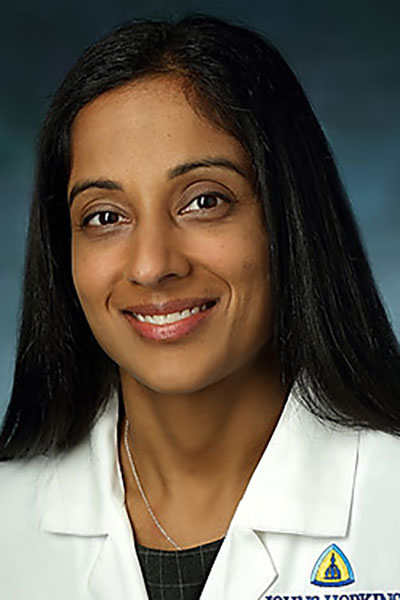New insights into the diagnosis, management, and prevention of COPD will be highlighted in the ATS 2024 International Conference scientific program.

The ATS Conference News spoke with Nirupama Putcha, MD, MHS, about the important dialogue taking place among COPD specialists and what these respiratory health professionals can expect from the conference in San Diego this May. Dr. Putcha is an associate professor of medicine at Johns Hopkins University and program chair for clinical problems at ATS 2024 San Diego.
What new developments in COPD can attendees expect to learn more about at the ATS 2024 International Conference?
Dr. Putcha: There’s definitely a fair amount of content related to treatment trials. Some of these are continued analyses of large-scale clinical trials with new therapeutics that were previously completed, and there are ongoing subgroup analyses of the scope of efficacy for certain drugs.
There are a number of relevant clinical trial results that will be discussed, and I think those discussions will only grow as the late-breaking clinical trial results are submitted and reviewed closer to this year’s conference.
There are a couple of other areas at the International Conference relevant for those interested in COPD: In terms of research findings, there is a lot of interesting work taking place in the realm of early COPD, along with studies that will be reporting data analyzing the value of creating algorithms for screening and diagnosis of COPD. There are also several studies looking at the progression and development of the disease in an early stage to understand early markers of COPD using physiologic markers as well as novel imaging and CT tools to help people understand what’s relevant in the early COPD space.
There are also plenty of learning opportunities in areas related to COPD and comorbidities. Over the past several years, we have seen numerous studies analyzing comorbid diseases, particularly cardiovascular diseases, and other important comorbidities, and how those factors influence the disease severity. Like previous years at the conference, we will see more of that type of research but with increasing influences from the many ‘omics disciplines to deepen that area of investigation, which is an exciting direction generally in the COPD world.
What opportunities outside of the scientific program will conference attendees have to learn about and discuss COPD?
Dr. Putcha: We have several poster-based sessions focused on interesting ways to leverage electronic medical records and big data algorithms to help understand the epidemiology and outcomes related to COPD. Those topics are still fairly novel, and I think it’s an emerging area we will discuss more and more in the coming years.
There are also some interesting Postgraduate Courses, including a course on state-of-the-art treatments for COPD in 2024 that will tackle the clinical care and management of the disease. Another Postgraduate Course is about understanding how to use multi-omics to understand the mechanisms of COPD. I think both of those will be engaging, unique sessions for people attending the postgraduate offerings.
What advice would you give physicians interested in learning more about COPD to make the most of the International Conference experience in San Diego?
Dr. Putcha: I find that the Clinical Year in Review is always a great place to hear about the newest and most discussed literature in the past year to get a sense of what experts are focusing on in COPD.
Outside of those more general sessions, where attendees should target their efforts probably depends on what’s most relevant and engaging to them. There are a lot of very interesting Scientific Symposia targeted at research-oriented audiences. For those more interested in the clinical care of COPD, there are poster sessions and Mini Symposia, which answer important questions for clinicians about the most relevant types of interventions to think about for our patients and managing complex patients with COPD.
What is at the forefront of the dialogue surrounding COPD among specialists in this space right now?
Dr. Putcha: There are a lot of people talking about clinical trials in COPD and looking ahead toward where we’re going from here. There is a general sense that we are at a crossroads for COPD, that it is an important time to think hard about how and where people should invest time and money in studying COPD treatments. It’s hard to find biomarkers and power for meaningful endpoints with COPD, and large-scale clinical trials require a lot of money.
So, there are various lines of research attempting to parse those challenges, such as focusing on how to accurately subtype the disease as we move toward more precision therapeutics. There is also an interest in studying COPD earlier in the disease course, not just for prevention but also in therapeutics for patients who don’t have overt or severe COPD yet but might be set up for better outcomes if they are treated earlier.
What excites you about COPD right now and into the future?
Dr. Putcha: As the program chair for clinical problems at the International Conference, I’ve been thinking about how much programming there is about COPD across various Assemblies in the Society that is really impressive. Almost every Assembly is analyzing and discussing something relevant to the treatment of COPD from different angles, such as translational or basic research, clinical trials, multiomics, implementation science, and health disparities to name just a few. Given the prevalence of the disease, it’s great to know that there are so many experts working to advance research and treatment for patients. ATS 2024 will be an exciting place for experts in these many fields to convene and help advance the science in this field together.
Don’t Miss ATS 2024 Highlights: On Demand
Don’t forget that ATS 2024 Highlights: On Demand are available to all conference registrants! On Demand will give you access to the Opening Ceremony, Plenary Session, Keynote Series, Clinical Year in Review, Adult Clinical Core Curriculum, and so much more. The topics will cover ILD, asthma, health equity, and CF, to name just a few. On Demand content will be accessible to all ATS 2024 full conference and On Demand registrants until March 2025.
